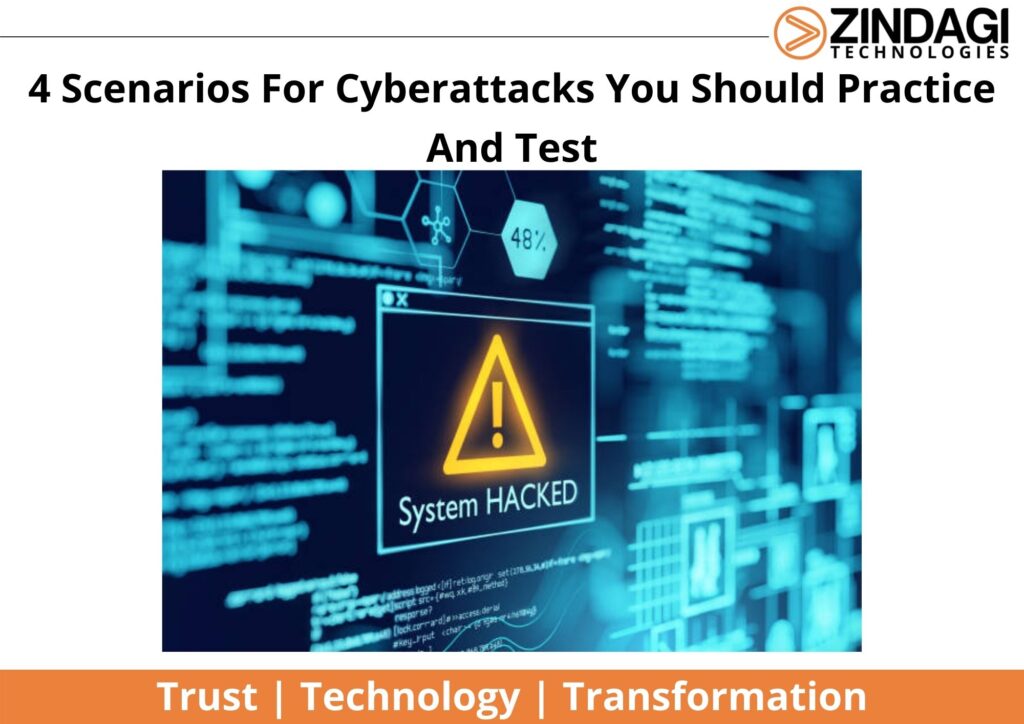4 Scenarios For Cyberattacks You Should Practice And Test.

Tests are important and, in every scenario, they are to be conducted, specially in a case of a cyberattack . When cybersecurity is a concern for a company then the organization should conduct cybersecurity audits and tests to ensure the smooth servicing of the company. Cyber security services should be opted for by every organization so that they do not face any cyber circumstance that wipes off their company data or steal the information.
The responsibility of the IT department is that regular tests are conducted in different scenarios so that if any scenario is faced then the team knows how to handle it. To keep the business continuity, proper management of disaster recovery and conducting lots of tests will keep the organization ready at the time of the attack.
The team will be testing for the external attacks that they can handle and nullify. But what about the inside threats? What about testing your people and knowing if they have enough knowledge about cybersecurity or not? IT teams response to a ransomware attack is important too as they should know how to act.
We will give and discuss 4 scenarios that you will use to make sure that your team is ready for any type of cyber attack.
Prepare Your Security Team

The lack of preparedness is a bigger problem than technology. One has to prepare the employees in operational exercises as the real attack is similar, so they know how to react. Getting cybersecurity professional services for this task is always a good idea as they will be able to explain the demo and the real attack very diversely.
Hands-on experience of cyber exercises should be given to all the employees. Plan out like:
- Identify the roles and responsibilities
- Decision-making responsibilities
- The understanding of protocols and necessities should be strong
- The capacity to recover from the successful response and recovery from the unfortunate event.
Train Your Security Team Well
There are many scenarios and if we go through each one of them then we will have to train them a lot so we have the 4 most common scenarios and how should you respond in such situations.

Phishing Attacks
With ransomware attacks on the rise, the frequency of phishing emails and overall business email compromise (BEC) has increased. According to recent research, ransomware currently makes up 27% of malware instances, and 18% of enterprises stopped at least one ransomware variant in 2019. The first step is to teach staff members the importance of exercising due diligence, and practicing phishing scenarios can be a useful teaching tool.
Malicious Attachments & Malware
It’s just as crucial for your security staff to be aware of when ransomware, in particular, enters a network as it is to prevent opening it. If ransomware-infected websites are visited by your employees or harmful attachments slip through your filters and into their inboxes, you need to have a plan in place that has been tested so that you can react fast and minimize the damage.
Password Requests And Other Suspicious Demands
To get access to systems and data, cybercriminals frequently employ social engineering tactics. To trick employees into disclosing private passwords and other access restrictions, they can assume the identities of other people, such as coworkers or third-party providers. Your security staff should receive training on how to react. By conducting drills that imitate password demands from well-known sources like cybersecurity consulting services or even executives, who are frequently spoofed, you can test your incident response teams and staff.
Unauthorized Devices And Users On Networks
Attackers can easily target computers and other devices that haven’t gone through the required authentication procedures before connecting to your business network. Can your response teams not only recognize but also stop attempts to connect to your network? Have you put their speed at doing this to the test? Are you keeping an eye on access to places like Amazon Web Services (AWS), Microsoft Azure, Google, or Office 365 if you use cloud apps and infrastructure? Even if your company is “only experimenting” with cloud platforms and services, you might still be exposed to security flaws and abuse if these resources are not set up for maximum protection or if someone with access sets up rogue accounts or activities on them. Zindagi Technologies can help you with this.
These are just a few examples of the cyber incident scenarios you can use to gauge how well prepared your incident response team is. Regular practice of these may make your team more prepared and help you find any flaws before a crisis, saving you time, money, and peace of mind. Zindagi Technologies is a leading cybersecurity services provider and we are the one-stop destination for all your cybersecurity needs. If you need cybersecurity consulting services for your company, then you can give us a call on +91-9773973971.
Author
Shweta
Senior Executive, S&M
